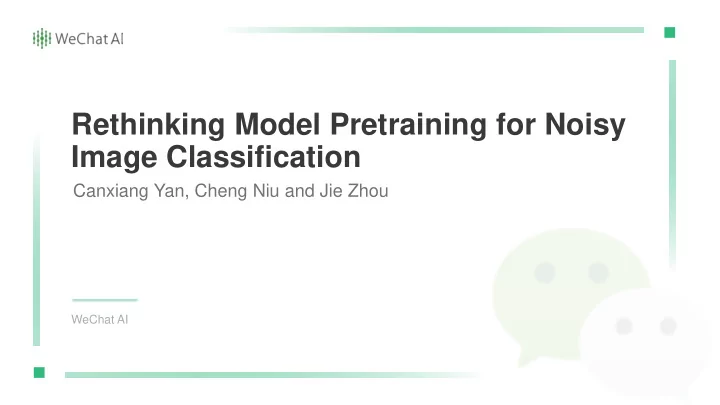

Rethinking Model Pretraining for Noisy Image Classification Canxiang Yan, Cheng Niu and Jie Zhou WeChat AI
CONTENT • Noise in Webvision • How to make use of noisy data • Tagging images with multiple keywords • Weighting labels with semantic similarity • Pretraining • Pretraining with weakly-tagged image set • Pretraining with label-weighted image set • Finetuning • Experiments • Effectiveness of our pretraining • Conclusion
Noise in Webvision • Webvision is collected from Google and Flickr • 5000 visual concepts and 16 million images. • each image may have description, title or tags. • Noise types • Images with inaccurate surrounding text. Tagging images with multiple keywords • Queries with unrelated reference images. Weighting labels with semantic similarity (a) Keywords missing in text. Google: Vulpes+macrotis (b) Target missing in images. Flickr: grey+whale
Tagging images with multiple keywords keyword distribution • We tag an image by extracting keywords from 600 its context. 500 • NTLK is used to recognize nouns and adjectives . 400 • Most common keywords are removed, as well as 300 augusta bassist least common ones. 200 voiture burg radiological vivir • There are totally 35k keywords and about five 100 0 for each image. 0 5000 10000 15000 20000 25000 30000 35000 Label : n02432511 mule deer, burro deer, Odocoileus hemionus Label : n02152881 prey, quarry Query : 7849 mule+deer Query : 9171 prey beast Description : Description : We were hiking in the Kaibab National Forest The cheetah examines south of Williams Arizona on the Sycamore Rim Trail and saw this district young pup cheetah africa savannah desiccated Mountain lion scat. The mountain lion diet in this area animal wildcat big cat mammal mammalian consists largely of ungulates , more specifically Mule deer , Pronghorn predator beast of prey carnivore and Elk. The fur passes through their digestive track and creates very distinctive scat. Feces of wild carnivores are referred to as Title : cheetah africa savannah animal wildcat big cat mammal mammalian scat. Hunters and trackers get vital info from scat. Because this is so desiccated, we were not in immediate danger . I've seen National Park Rangers diagnose the health of animals from dung and scat. Title : Scatology 101 - Mountain lion
Weighting labels with semantic similarity Top-k: Weighting labels label1: 0.77 Text Similarity label2: 0.45 label3: 0.31 label4: 0.28 label5: 0.11 Wilson's warbler KNN labels Nearest synsets defined by WordNet Others parula warbler Cape May warbler Blackburnian warbler yellow warbler yellowthroat
Pretraining with weakly-tagged image set (WT-Set) • Treat it as a multi-label classification task. • Class-balanced sampling is used for long-tail problem. • Multi-label loss is defined to sum over cross-entropy losses on each target label. Multi-label loss CNN Sum over Cross-entropy loss
Pretraining with label-weighted image set (LW-Set) • Each image use weights to represent semantic correlations to the defined visual concepts. • Based on the multi-label loss, label-weighted loss is to sum over losses with pre- defined weights on each target label. weights Label-weighted loss CNN Sum over Cross-entropy loss
Finetuning • With the pretrained models on hand, we train the 5000-class model by • Initializing model weights except the last linear layer • Revising the last linear layer with 5000-dim output and random parameters. • Dataloader: • Class-balanced sampling • Optimizer: • SGD + Momentum • Learning rate: starts from 0.01, decayed by 0.1 for each 90 epochs • Gradient Accumulation • Batch size: 256 • Accumulate gradients for each 8 steps
Experiments • Effectiveness of our pretraining Model Pretrain Top1-accuaracy Top5-accuracy ResNeSt-101 w/o 52.0% 76.1% ResNeSt-101 LW-Set 53.4% 76.8% ResNeSt-101 WT-Set 55.5% 77.8% • Different backbones Model Pretrain Top1-accuaracy Top5-accuracy ResNeXt-101 WT-Set 55.0% 78.1% EfficientNet-B4 WT-Set 54.4% 77.0% ResNeSt-200 WT-Set 56.1% 78.7%
Tricks to boost performance • Large-resolution finetuning • Finetune converged model with larger input size and continuous learning rate. • Class-balanced sampling • It’s importance for long -tail classification • Pseudo labeling • Use best models to assign pseudo labels to each image and train them again. • Multi-model ensembling • Different pretraining strategies and different backbones • Final test result
Conclusion • We propose model pretraining strategies on noise images by • Tagging images with multiple keywords • Weighting labels with semantic similarity • Experimental results prove the effectiveness of pretraining • Better performance • Faster convergence • Future works • Ablation study on different keyword sets. • Multi-task multi-label pretraining
Thanks WeChat AI
Recommend
More recommend